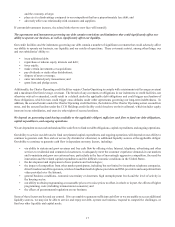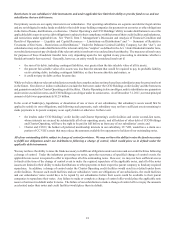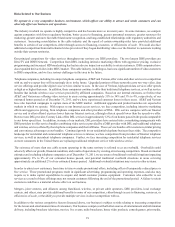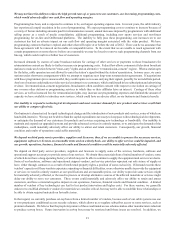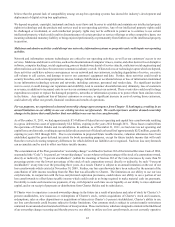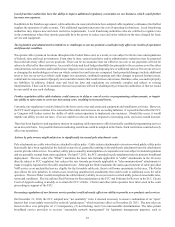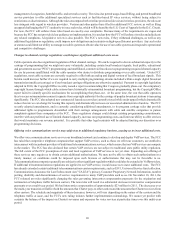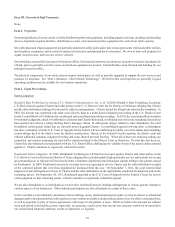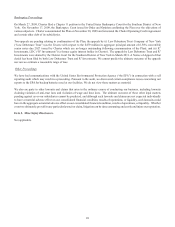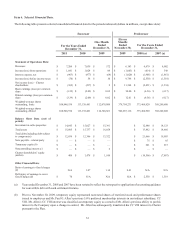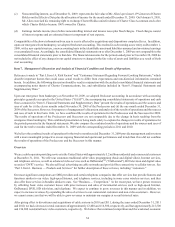Charter 2011 Annual Report Download - page 38
Download and view the complete annual report
Please find page 38 of the 2011 Charter annual report below. You can navigate through the pages in the report by either clicking on the pages listed below, or by using the keyword search tool below to find specific information within the annual report.26
management of congestion, harmful traffic, and network security. The rules also permit usage-based billing, and permit broadband
service providers to offer additional specialized services such as facilities-based IP voice services, without being subject to
restrictions on discrimination. Although the rules encompass both wireline providers (like us) and wireless providers, the rules are
less stringent with regard to wireless providers. Verizon and other parties have filed for additional FCC review, as well as filing
an appeal challenging the FCC’s authority to issue such rules, which will be heard by the U.S. Court of Appeals for the D.C. Circuit.
For now, the FCC will enforce these rules based on case-by-case complaints. Because many of the requirements are vague and
because the FCC has not provided clear guidance on implementation, it is unclear how the FCC will enforce its rules and adjudicate
any related complaints. A legislative review is also possible. The FCC’s new rules, if they withstand challenges, as well as any
additional legislation or regulation, could impose new obligations and restraints on high-speed Internet providers. Any such rules
or statutes could limit our ability to manage our cable systems to obtain value for use of our cable systems and respond to operational
and competitive challenges.
Changes in channel carriage regulations could impose significant additional costs on us.
Cable operators also face significant regulation of their channel carriage. We can be required to devote substantial capacity to the
carriage of programming that we might not carry voluntarily, including certain local broadcast signals; local public, educational
and government access (“PEG”) programming; and unaffiliated, commercial leased access programming (required channel capacity
for use by persons unaffiliated with the cable operator who desire to distribute programming over a cable system). Under FCC
regulations, most cable systems are currently required to offer both an analog and digital version of local broadcast signals. This
burden could increase further if we are required to carry multiple programming streams included within a single digital broadcast
transmission (multicast carriage) or if our broadcast carriage obligations are otherwise expanded. Pursuant to copyright legislation
adopted in 2010, the Copyright Office recently issued a report recommending that Congress gradually phase-out the compulsory
copyright license through which cable systems have historically retransmitted broadcast programming, but the Copyright Office
report failed to identify specific mechanisms for accomplishing that phase-out. At the same time, the cost that cable operators
face to secure retransmission consent (separate from copyright authority) for the carriage of popular broadcast stations is increasing
significantly. The FCC also adopted new commercial leased access rules (currently stayed while under appeal) which dramatically
reduce the rate we can charge for leasing this capacity and dramatically increase our associated administrative burdens. The FCC
recently adopted amendments, and is currently considering additional amendments, to its program carriage rules that provide
additional rights to programmers dissatisfied with their carriage arrangements with cable and satellite companies to pursue
complaints against these companies at the FCC. These regulatory changes could disrupt existing programming commitments,
interfere with our preferred use of limited channel capacity, increase our programming costs, and limit our ability to offer services
that would maximize our revenue potential. It is possible that other legal restraints will be adopted limiting our discretion over
programming decisions.
Offering voice communications service may subject us to additional regulatory burdens, causing us to incur additional costs.
We offer voice communications services over our broadband network and continue to develop and deploy VoIP services. The FCC
has ruled that competitive telephone companies that support VoIP services, such as those we offer our customers, are entitled to
interconnect with incumbent providers of traditional telecommunications services, which ensure that our VoIP services can compete
in the market. The FCC has also declared that certain VoIP services are not subject to traditional state public utility regulation.
The full extent of the FCC preemption of state and local regulation of VoIP services is not yet clear. Expanding our offering of
these services may require us to obtain certain additional authorizations. We may not be able to obtain such authorizations in a
timely manner, or conditions could be imposed upon such licenses or authorizations that may not be favorable to us.
Telecommunications companies generally are subject to other significant regulation which could also be extended to VoIP providers.
If additional telecommunications regulations are applied to our VoIP service, it could cause us to incur additional costs. The FCC
has already extended certain traditional telecommunications carrier requirements, such as E911, Universal Service fund collection,
Communications Assistance for Law Enforcement Act ("CALEA"), privacy, Customer Proprietary Network Information, number
porting, disability and discontinuance of service requirements to many VoIP providers such as us. On November 18, 2011, the
FCC released an order significantly changing the rules governing intercarrier compensation payments for the origination and
termination of telephone traffic between carriers. The new rules will result in a substantial decrease in intercarrier compensation
payments over a multi-year period. We had intercarrier compensation of approximately $23 million in 2011. The decreases over
the multi-year transition will affect both the amounts that Charter pays to other carriers and the amounts that Charter receives from
other carriers. The schedule and magnitude of these decreases, however, will vary depending on the nature of the carriers and the
telephone traffic at issue, and the FCC's new ruling initiates further implementation rulemakings. We cannot yet predict with
certainty the balance of the impact on Charter's revenues and expenses for voice services at particular times over this multi-year
period.



